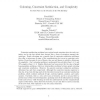174 search results - page 28 / 35 » Computer Science and Game Theory: A Brief Survey |
136
click to vote
SIGECOM
2005
ACM
15 years 7 months ago
2005
ACM
We introduce a new class of games, congestion games with failures (CGFs), which extends the class of congestion games to allow for facility failures. In a basic CGF (BCGF) agents ...
171
Voted
DIMACS
1996
15 years 3 months ago
1996
in Structure'95. 14] R. Fagin. Easier ways to win logical games. In Proc. DIMACS Workshop on Descriptive Complexity and Finite Models, AMS 1997. 15] R. Fagin, L. Stockmeyer, M...
120
click to vote
CORR
2006
Springer
15 years 1 months ago
2006
Springer
Abstract. In combinatorics, the probabilistic method is a very powerful tool to prove the existence of combinatorial objects with interesting and useful properties. Explicit constr...
128
click to vote
CSR
2008
Springer
15 years 1 months ago
2008
Springer
Constraint satisfaction problems have enjoyed much attention since the early seventies, and in the last decade have become also a focus of attention amongst theoreticians. Graph c...
117
click to vote
SOFSEM
2009
Springer
15 years 10 months ago
2009
Springer
Abstract. Computational mechanism design (CMD) seeks to understand how to design game forms that induce desirable outcomes in multiagent systems despite private information, self-i...


